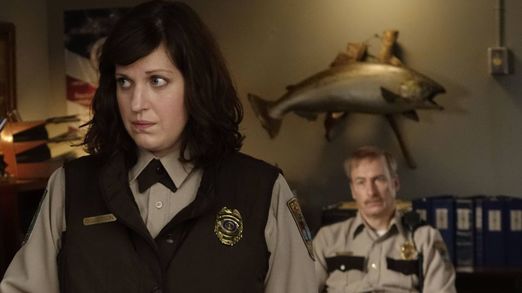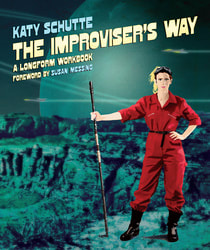 You’ve probably heard of Chekhov’s Gun, it comes up in narrative improv as much as Schrodinger’s Cat comes up in science fiction. Let me open with the fact that I do both narrative and non-narrative/freeform improv shows. So, if this blog sounds negative, it’s not meant that way. I absolutely thrill whilst I jot my Oh Boy! The Quantum Leap Show structure on the blackboard and our new Maydays musical is as Hero’s Journey as they come. But let’s talk about the opposite of Chekhov’s Gun and how exciting and freeing it can be. I’m going to call it Coens' Gloves. About a year ago, I heard a podcast (listen at 12:30) with the makers of FX's Fargo TV series. I loved the show and was so happy to hear this story told in one of the episodes: (to paraphrase) A man gets on a train, as the train starts to move, he realises that he only has one glove in his hand. He looks out of the window and sees the other one on the platform. There is no one near it and he doesn’t have time to get off the train and retrieve it. What does he do? He throws his other glove out of the window. That way, at least one person will have a pair. I loved this parable in the show. Lots of people debated what it meant and why the character told the story. The writer - actually Noah Hawley and not the Coen bros - talked about how the Coens used various stories and moments in their films which pertained to nothing. Life is full of irrelevances, of strange and incongruent moments. The writer fought for this story staying in his script and won, despite that fact that it was not part of the plot (or even character development, necessarily). He was emulating the style of the Coen brothers and therefore emulating the randomness of human existence. ""Once you take away that Joseph Campbell Journey bullshit... then you're doing something that people can't predict as well... but it has to be satisfying". Not everything you do in improv has to serve the story. That doesn’t mean you can drop information or pay less attention, it means that you can choose what is important to the story and what is important to the feel of the story.
Let’s not follow the road well-travelled. I would rather watch (or play in) a show where I’m surprised and delighted at what is happening than honour a plot that is predictable and cliché. One of the most fun things about improv is how it differs from writing; that we discover something more organic than perfectly driven narrative and something that can only be produced by a group mind in this moment. This one. Freeform improv is a discipline. It doesn’t mean going straight to wacky land or adding too much information. It’s just as hard (harder?) as telling a neat story and when you’re good at that neat story, you can decide to get off the path. It’s Fargo’s truth, or the feeling of truth that I love the most about improv and if truth means leaving Chekhov’s gun on the wall for the whole show, I’m down with it. Perhaps that unfired gun will hang there as a metaphor for the emotional impotence of one of our characters, perhaps it will portend a darker future, or perhaps it will prompt the audience to think about their own guns (their potential, their rage, their secrets). One thing that narrative and freeform agree on however, is that whatever that gun is there for; it's important. Just: fuck firing it by the end of Act II.
15 Comments
I still like Chekhov's gun (I don't love the fact that it's a gun, but I like the principle of stuff that happens earlier will matter later). It's a simple - perhaps too simple at times - way of making sure that the stuff that is included in a narrative matters. And promotes an economical approach to storytelling.
Reply
John Cremer
29/7/2015 14:08:41
This may well be the source of the Coen glove story http://www.citehr.com/411884-gandhi-shoe-story.html
Reply
Katy
29/7/2015 16:16:51
Hi Ryan, thanks for commenting. I'm suggesting that stuff that 'doesn't matter' is extremely important. The characters and the audience care about it, simply because it is the essence of life and not a major plot point. Unless you believe everything in your life is rich and serendipitous? Then I can't help you.
Reply
Katy
29/7/2015 16:20:35
Thanks, John! That's awesome. I knew it must have roots somewhere.
Reply
Sam R
29/7/2015 16:36:01
If an audience believes in the performers' world, they can also read meaning on their own, inserting symbolism and making connections on performers' behalf. To quote a recent teacher, we can have the illusion of subtext when we barely have text.
Reply
DanJW
30/7/2015 01:48:19
The opposite of Chekhov's gun is either a red herring (the gun is shown, has a perfect moment to be used, but is then left on the wall) or a deus ex machina (the gun is not foreshadowed, it just appears when it needs to be used to save the day).
Reply
The glove story you quote is thought-provoking and rich with meaning, whether it relates to the central action or not. I'm not saying interesting diversions and details that enrich the story shouldn't be used, I even think slice of life scenes have their place too. I'm just against failing to fulfill promises you've made to the audience or justifying lazy, bad, or indifferent storytelling by saying that the mundanity is part of the essence of life.
Reply
Katy
30/7/2015 02:35:41
Hi Dan,
Reply
Katy
30/7/2015 02:38:10
Ryan,
Reply
Kit
30/7/2015 02:47:13
Love it! Yes!
Reply
Andrew
30/7/2015 04:12:13
I guess that if we all worry about Chekov's Gun while improvising, we're stuck in our heads, putting the pressure on ourselves to 'save' the story ..
Reply
Katy, thank you so much for this post.
Reply
Jason Bennett
27/10/2022 22:08:02
I really want to thank Dr Emu for saving my marriage. My wife really treated me badly and left home for almost 3 month this got me sick and confused. Then I told my friend about how my wife has changed towards me. Then she told me to contact Dr Emu that he will help me bring back my wife and change her back to a good woman. I never believed in all this but I gave it a try. Dr Emu casted a spell of return of love on her, and my wife came back home for forgiveness and today we are happy again. If you are going through any relationship stress or you want back your Ex or Divorce husband you can contact his whatsapp +2347012841542 or email emutemple@gmail.com
Reply
Manuel Franco
26/5/2023 11:11:36
I just want to say Thank You to everyone who supported me through the years. My name is Manuel Franco, New Berlin, Wisconsin. My story of how I won the Powerball lottery of $768.4M is a bit of a tale. I have been playing Powerball tickets for 6 years now since I turned 18. I bought my first ticket on my 18 birthday. I was feeling very lucky that day because I had contacted Dr. Odunga Michael to help me with the winning Powerball numbers. I really had that great great feeling that I looked at the camera wanting to wink at it. I only did a tiny part of it and trusted him. He gave me the numbers after I played a couple other tickets along with it for $10. I checked my ticket after the winnings came online and saw the numbers were correct including the Power play. I screamed for about 10 minutes because it felt like a dream. I had won $768.4M. You can check my winning testimony with the lottery officials just with my name search. Thank you Dr Odunga. Well, his email is odungaspelltemple@gmail.com and you can also call or Whats-app him at +2348167159012 so you guys can contact him
Reply
Stephanie Sally
30/8/2023 09:42:36
Hello everyone, I am from Wembley, Britain. I want to write this testimony to tell others and thank Dr. Odunga for what he has done for me. The first 12 years of my marriage I had 5 miscarriages and I was called all sorts of names by my mother-in-law and this made my marriage life very hectic and a burden of sorrow. I contacted Dr. Odunga for help and I will say that he is a very strong and honest man and he indeed helped me solve my problem. I saw his email in a testimony and I contacted him, little did I know it would be the end of all my problems. After 2 days of contact, I received a fertility herb and he told me to use it. The herb worked and my husband even loved me more and bought me expensive things. One afternoon, I went to a nearby hospital and came back home with the positive result of my pregnancy and after 9 months I gave birth to a baby boy. Ever since I contacted Dr. Odunga, my story has been different. I have 3 children at present and I am very happy in my marriage. Please, contact him at odungaspelltemple@gmail.com OR Whats App him +2348167159012 to help you too
Reply
Leave a Reply. |
Buy the Book!Enjoy my blog? Fancy buying me a cuppa to celebrate?
There are many blogs! Search here for unlisted topics or contact me.
AuthorKaty Schutte is a London-based improviser who teaches improv classes and performs shows globally. Recent Posts |

 RSS Feed
RSS Feed